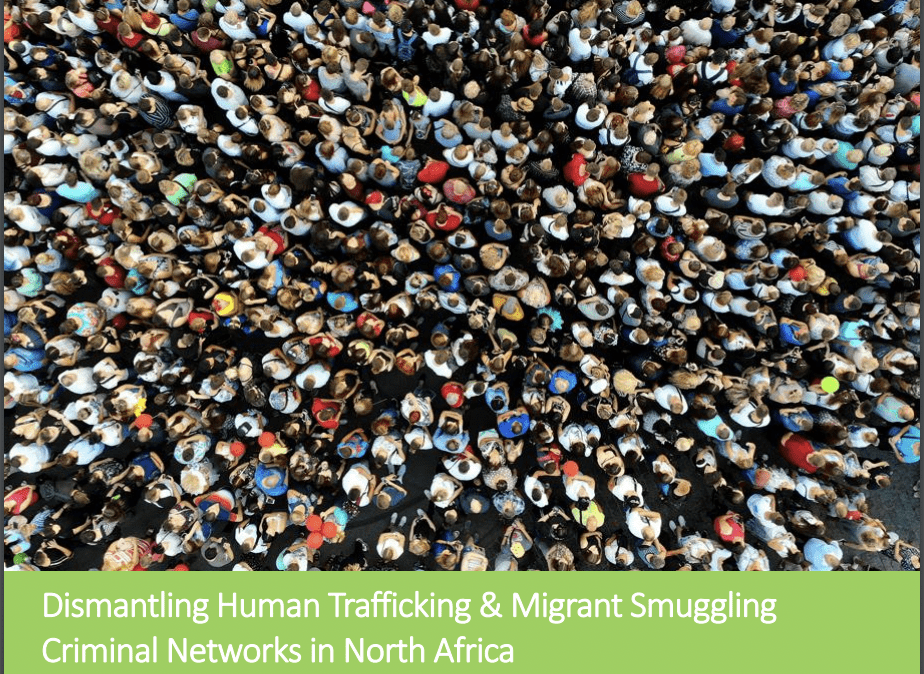
Dismantling Human Trafficking & Migrant Smuggling Criminal Networks in North Africa
Context
In August 2019, the EU and UNODC launched a new programme worth Euro 15 million to step up efforts in the North Africa region to counter criminal networks involved in migrant smuggling and human trafficking under the framework of the EU Trust Fund for Africa to support international efforts to address migration challenges in the Mediterranean. The project focuses on the regional dimension of the fight against smugglers and traffickers while at the same time upholding the rights of migrants, refugees, asylum seekers and vulnerable groups. The project will cover Egypt, Libya, Morocco and Tunisia. Human trafficking and migrant smuggling are forms of transnational organized crime that particularly affect the North Africa region, with most countries simultaneously representing points of origin, transit and destination, and the proximity of North African shores to Southern Europe has made these countries an attractive hub for irregular migration. The destabilizing effect of such flows and their impact on development and security in North African countries is serious, posing a threat to governance and stability in the entire region and beyond. Criminal networks have intensified their operations across North Africa and there is increased evidence of connections between organized criminal networks and terrorist groups. Furthermore, profits generated from such criminal activities, including migrant smuggling and human trafficking, can be used for corruption.
Project Objectives
The overall objective of this project is to enhance the capacities of Egypt, Libya, Morocco and Tunisia to effectively dismantle criminal networks involved in migrant smuggling and human trafficking. This will be achieved through: 1. Enhanced detection and interception capacities of front-line officers at selected border crossing points and key hub cities along smuggling routes; 2. Strengthened capacities of first responders (a specialized personnel who is among the first to arrive and provide assistance at the scene of an emergency) to identify and investigate cases of migrant smuggling and human trafficking, while protecting trafficking victims and vulnerable migrants; 3. Enhanced skills and knowledge of law enforcement authorities on special investigation techniques that will allow for the effective dismantling of criminal networks; 4. Strengthened skills in adjudicating migrant smuggling and human trafficking cases, with an emphasis on regional and international cooperation. UNODC will deliver capacity building and provide light equipment, such as IT and forensic tools to actors dealing with law enforcement and criminal justice. The final beneficiaries will be the general public, victims of trafficking, smuggled migrants, and families of the latter two categories.
Under Focus Area I ‘Identification and Interception’, UNODC will enhance the capacities of counterparts to effectively detect and intercept criminals involved in migrant smuggling and human trafficking at border crossing points and key hub cities along smuggling routes. This will be achieved through building capacities of frontline officers on various special techniques, such as document fraud, profiling, and interviewing techniques, and through the provision of light equipment. Under Focus Area II ‘Investigation and Referral’, UNODC will build capacities of first responders from the four countries in identifying and investigating migrant smuggling and human trafficking cases. UNODC will also respond to the need to improve assistance to trafficking victims and smuggled migrants and build capacities of labor inspectors, healthcare practitioners, social workers and consular staff on the identification and referral of victims and survivors.
Under Focus Area III ‘Special Investigation Techniques’, UNODC will address the needs of counterparts with regards to special investigation techniques, such as criminal intelligence analysis, crime scene investigation and evidence management, and the use of digital forensic evidence during the investigation and prosecution of organized crime groups.
Under Focus Area IV ‘Prosecution and Adjudication’, UNODC will support the beneficiary countries in the prosecution and adjudication of migrant smuggling and human trafficking cases, with the aim to elevate capacities of judges and prosecutors through in-depth capacity-building that will include the delivery of mock trial programmes. The project will place emphasis on the promotion of regional and international cooperation on migrant smuggling and human trafficking cases.
Read more here.
